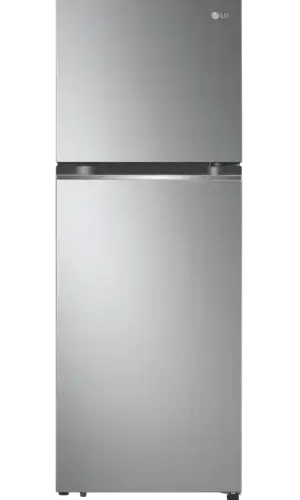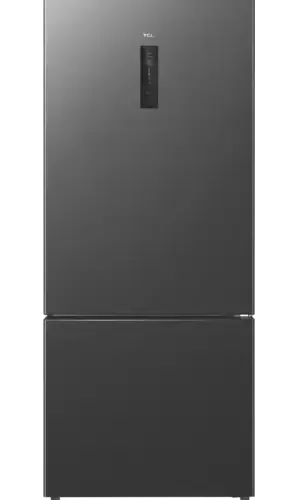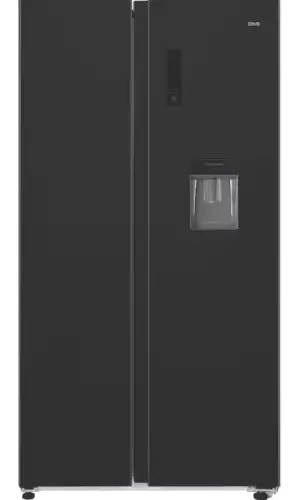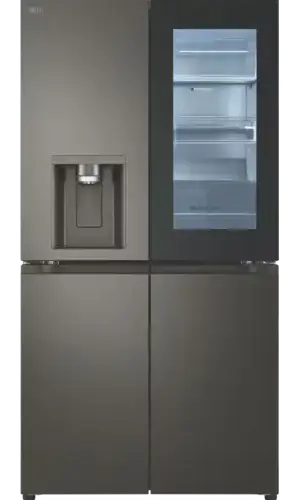Fridge Capacity Calculator
Answer a few quick questions and we'll recommend the ideal refrigerator type and size for your household needs.
How many people are in your household?
Refrigerator Types Comparison
Understanding the different types of refrigerators can help you make the best choice for your needs. Each design has unique advantages for different households.

The classic refrigerator design with the freezer compartment on top and the refrigerator section below.
Pros
- Most affordable option
- Energy efficient
- Space-saving design
- Wide range of sizes available
Cons
- Less freezer organisation options
- Requires bending to access lower fridge shelves
- Limited features compared to other models
- More basic aesthetic
Ideal For:
Budget-conscious buyers, small households, apartments with limited space

Puts the refrigerator compartment at eye level with the freezer drawer at the bottom.
Pros
- Fresh food at eye level
- Freezer drawers for better organisation
- More ergonomic for accessing daily items
- Good energy efficiency
Cons
- More expensive than top freezer models
- Bending required to access freezer
- Typically takes up more floor space
- Fewer budget options available
Ideal For:
Small to medium households, families who prioritize fresh food access, energy-conscious consumers

Features a vertical split with the freezer on one side and the refrigerator on the other.
Pros
- Excellent freezer organisation
- No bending required for either compartment
- Often includes water/ice dispensers
- Good for narrow spaces (slim door swing)
Cons
- Limited width for large items
- Less energy efficient than other types
- Typically higher price point
- Less refrigerator space proportionally
Ideal For:
Households that use frozen foods frequently, narrow kitchens with limited door clearance, families wanting water/ice dispensers

Combines double doors on top for the refrigerator with a pull-out freezer drawer on the bottom.
Pros
- Maximum fresh food storage at eye level
- Wide shelves for large items and platters
- Drawers and specialised storage zones
- Premium look and features
Cons
- Most expensive option
- Largest footprint in the kitchen
- Higher maintenance costs
- More complex with potential for more repairs
Ideal For:
Larger households, gourmet cooks, entertainment-focused homes, consumers wanting premium features
Refrigerator Buying Tips
Beyond size and type, there are several other factors to consider when purchasing a new refrigerator. These tips will help you make a well-informed decision.
Measure Your Space
Before shopping, measure your available space carefully. Consider:
- Width, height and depth of the space
- Door clearance for opening/closing
- Pathway for delivery (doorways, stairs, etc.)
- Required ventilation space (typically 2-3cm on sides/top)
Pro Tip: Draw a floor plan with measurements to bring with you when shopping.
Check Energy Ratings
Energy efficiency affects your long-term costs. Look for:
- Higher star ratings (more stars = more efficient)
- Annual energy consumption (kWh per year)
- Inverter compressor models for better efficiency
- Energy-saving features like vacation mode
Consider Total Cost
The purchase price is just the beginning. Factor in:
- Energy costs over the appliance's lifetime
- Extended warranty options
- Installation fees if applicable
- Potential repair costs (check reliability ratings)
Pro Tip: A higher-priced, energy-efficient model often costs less in the long run.
Evaluate Features
Consider which features add real value for your family:
- Adjustable shelving for flexibility
- Water/ice dispensers (require plumbing)
- Smart features and connectivity
- Temperature-controlled drawers
- Door-in-door access for frequently used items
- Anti-fingerprint finishes
Pro Tip: Don't pay for features you won't use. Focus on what matters for your lifestyle.
Still Not Sure? Let Us Help!
Our team of appliance experts can provide personalized recommendations based on your needs and budget. We offer professional advice on refrigerator selection, sizing, and features.
Frequently Asked Questions
Common questions about refrigerator selection, sizing, and maintenance.
For a family of four, we typically recommend a refrigerator with 400-600 liters of capacity. This provides enough space for weekly groceries while accommodating food storage for meal preparation. If you shop in bulk or entertain frequently, you might want to consider models on the higher end of this range or even larger.
Refrigerator capacity is typically measured in liters or cubic feet (1 cubic foot ≈ 28.3 liters). When comparing models, look at both the total capacity and the split between refrigerator and freezer sections. Different households have different needs for fresh vs. frozen food storage, so consider your typical usage patterns.
For proper ventilation, leave at least 2-5cm of space on the sides and top of your refrigerator, and 5-10cm at the back. This allows heat to dissipate effectively, improving efficiency and preventing overheating. Also ensure your refrigerator has proper clearance for door opening and access to drawers.
Top freezer models are typically the most energy-efficient refrigerator type, followed by bottom freezer models. Side-by-side and French door refrigerators generally use more energy due to their larger size and additional features. However, modern high-efficiency models in any configuration can outperform older models, so always check the energy rating.
A quality refrigerator should last 10-15 years with proper maintenance. Premium models can sometimes last up to 20 years. To maximize lifespan, clean condenser coils regularly, maintain proper temperature settings, and address any issues promptly. Regular maintenance can prevent small problems from becoming major repairs.
As a general rule, if your refrigerator is more than 10 years old and the repair would cost more than 50% of a new model, replacement is often more economical. Newer models are significantly more energy-efficient, which can save you money on electricity over time. However, for minor repairs on otherwise functioning units, repair is usually the better option.
Water dispensers are convenient but require plumbing connections and filter replacements. Consider these factors: 1) Do you have easy access to water lines where the fridge will be placed? 2) Are you prepared for the additional maintenance of changing filters? 3) Is the convenience worth the additional cost and slightly reduced interior space? For many households, the convenience justifies these trade-offs.
Still Have Questions?
Our team of appliance experts is here to help you find the perfect refrigerator for your needs.
Contact UsNeed Help With Your Existing Refrigerator?
Our factory-trained technicians can diagnose and repair all major refrigerator brands. We offer same-day service with a 1-year warranty on all repairs - if you experience the same issue within the warranty period, we'll reinspect it for free.
